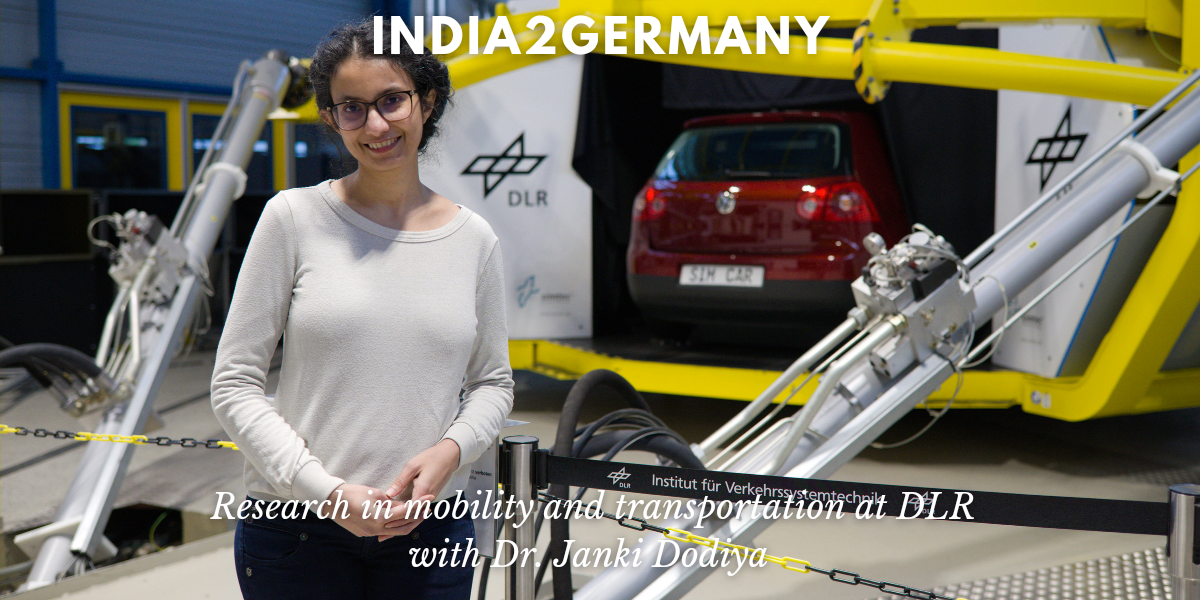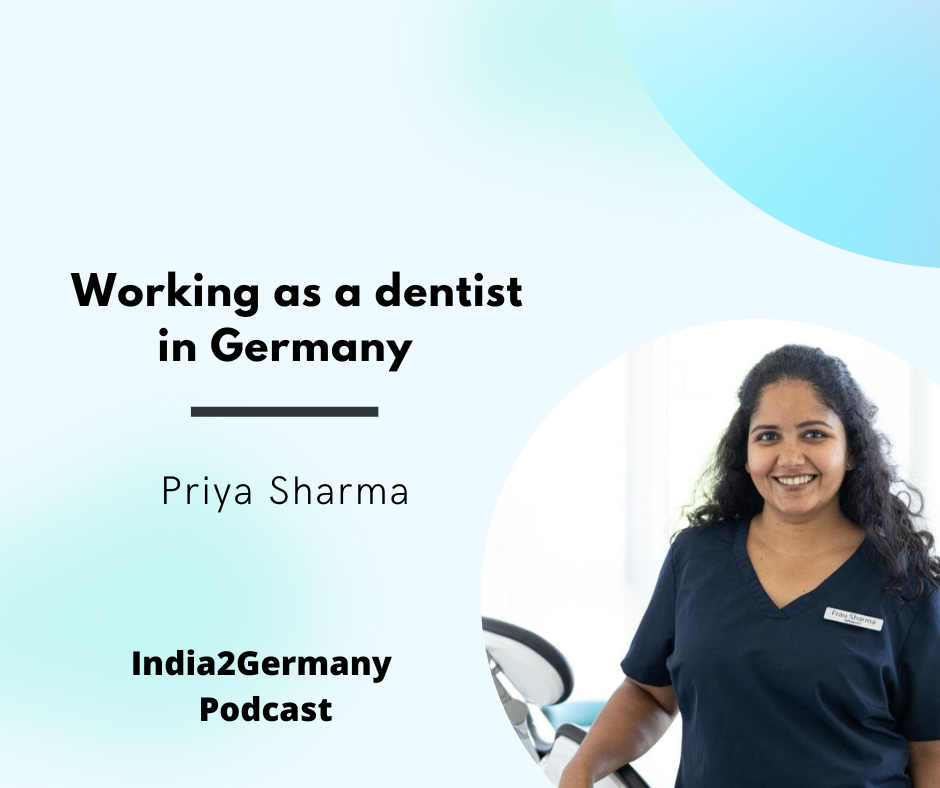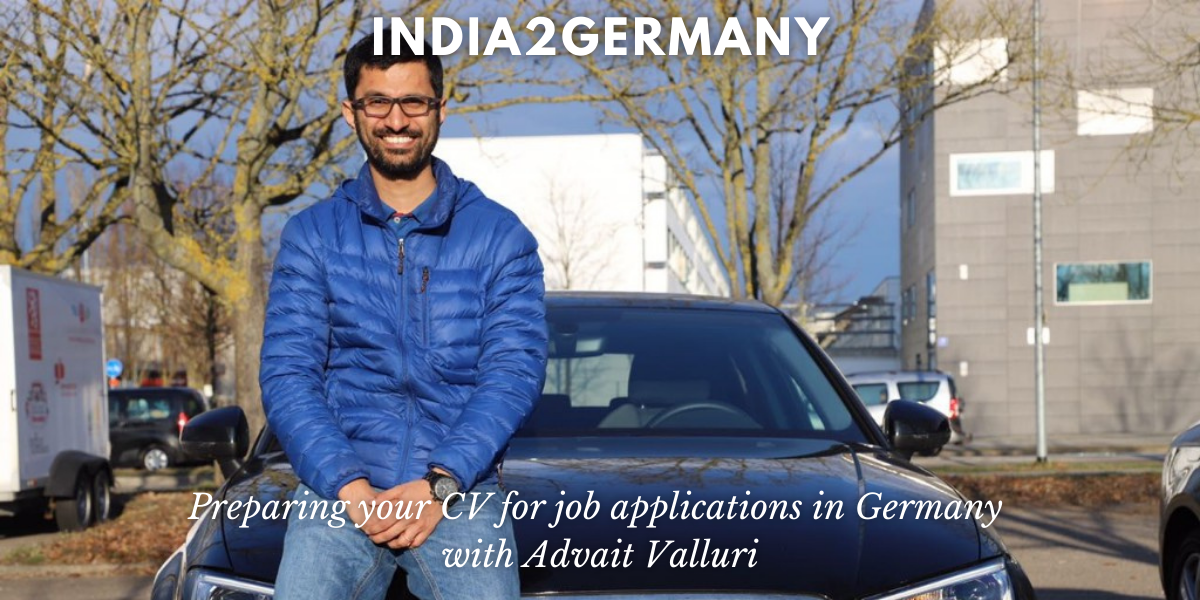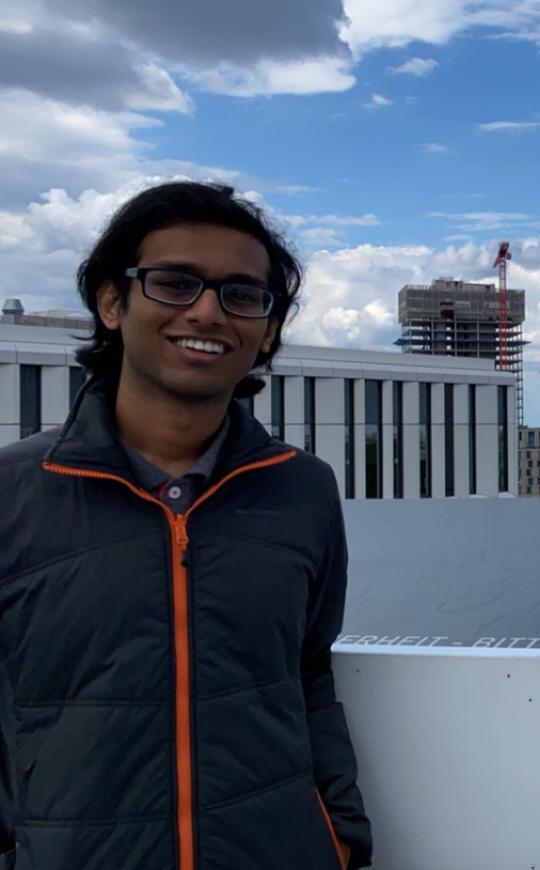
Research in mobility and transportation at DLR with Dr. Janki Dodiya
Mobility and transportation are very important topics worldwide with a huge scope for research and development. The German aerospace center, DLR, is engaged in a wide range of national and international research initiatives in this area. Our today's guest on India2Germany is Dr. Janki Dodiya who talks to us about research in mobility and transportation at DLR. Janki is a Senior Research Scientist at DLR and has extensive knowledge and experience in the areas of virtual reality, human machine interaction and mobility. She gives us an excellent overview of some of the ongoing research and career opportunities at DLR.
Hit Play to listen to this conversation and Follow to get notified about upcoming episodes.
Welcome Janki 👋. Could you give us an introduction to DLR?
The German Aerospace Center is the national centre for aerospace, energy transportation and digitalization research of Germany. It has multiple other locations throughout Germany with headquarters in Cologne. I am based at the site in Braunschweig in Lower Saxony. DLR is engaged in a wide range of research and development projects in national and international partnerships. In addition to conducting its own research projects, DLR also acts as the German space agency and is responsible for planning and implementing the German space programme on behalf of the German federal government. And it is also a project management agency, wherein it also coordinates and answers the technical and organisational implementation of projects funded by a number of German federal ministries.
What does DLR do in the area of mobility and transportation?
So with respect to mobility and transportation, DLR has various institutes working on different aspects of it, one is Institute of Transportation Systems (DLR-TS) where I work. There are also for instance other institutes, such as Institute of Vehicle Concepts and Institute of Transport Research. Since we are talking about mobility, I know that there are also institutes within aerospace working on concepts for air taxis for instance. However, I am sure there must be more, but these are the few that I am aware of.
The Institute of Transportation systems (DLR-TS) at DLR where I work, is one of the largest institutes at DLR Braunschweig site and part of it is also based in Berlin. One of the main objectives of research is the significant contribution to increasing safety and efficiency of road and railway traffic. With respect to actual sectors and technology fields, the institute works on various divisions including automotive, railway systems, public transport and intramodality as well as traffic management. And interdisciplinary teams of different technology fields design, develop and evaluate solutions for these divisions. It would be difficult for me to enlist all the technology groups here since it’s a long list but overall, the technology fields are vehicle function and development, data management, system architecture, human factors, testing and validation and evaluation of traffic. So, around 200 scientists from various fields like engineering, psychology and computer sciences do research and development for the Institute of Transportation Systems. Scientists cooperate with partners and customers from economy, science, and politics on a national and international basis and in that way the work is oriented both to the current and future needs of the market.
The research activities in the field of Railway Systems concentrate on the development of innovative technologies, methods and concepts for the operational, technical and economic optimisation of the railway system in the context of railway automation.
Apart from that, at DLR-TS one of achievements or from my perspective a significant contribution I would say is also that they have recognized the need for new testing approaches much earlier. It has developed its own chain of tool set along with many large dynamic virtual simulators and real testing facilities that can accommodate testing different aspects of transportation solutions individually or together, for instance traffic and behavioural simulation. And the real testing part includes various components such as research vehicles, and vehicle platforms on the infrastructure side, with data collection and tests in the city of Braunschweig. In fact, a very recent initiative by DLR in this direction is also Testfeld Niedersachsen. This Lower Saxony test field includes sections of several freeways, but also parts of other federal and state roads in the Hanover region. This allows testing in different traffic situations and in transition between different road types. A total of over 280 kilometres of routes with a wide variety of technical equipment are available and there are lots of different projects under this initiative.
📬 Get the latest India2Germany articles via email 📨
What is your topic of research at DLR?
My expertise lies at the intersection of virtual reality, HCI-multimodal interaction predominantly and I also have worked with visualization and computer graphics. And that’s what I bring to all institutes that I have worked at DLR. When I began at DLR-TS in late 2015, I was part of the system architecture group. My duties here were a mix but mainly project management and business development. This moreso has been a transitory or introductory role from space to transportation. Currently I work in the human machine interaction (HMI) group, where as the name suggests, I have been working on various projects that focus on design of HMI (Human machine Interaction) for future autonomous cars for different SAE levels and its evaluation using VR technology, which basically is an early part of the process before real site testing of these HMI functions within the boundaries of these projects. I am particularly interested in HMI design for special users such as elderly and disabled and I am also interested in use of exploring VR technology for HCI/HMI design. One important aspect about the role of a researcher is that others might find informative is that the duties go beyond just research, my duties in general at DLR have included research, ideation and acquisitions, project management, supervision and also for some time business development when I started here.
What are some of the important challenges and trends in the area of mobility and transportation?
Intelligent transportation and digitalization perhaps is what enables many new trends and challenges in the mobility sector, this would be at research, technological, industry, governance. With governance I mean from local infrastructural to national regulatory aspects. Most obvious trend is that of autonomous driving. The implementation of self-driving cars provides solutions to roadside accidents, traffic jams, and beyond. But we still have some way to go to perfect autonomous vehicles. Challenges lie ahead in technological solutions that enable smart decision making, perception sensors, mapping, data analytics and management etc.. Of course eventually it has to guarantee safety for the human riders. The challenges are multifaceted, it’s not only the driving that may be automated, but many aspects of traffic management and infrastructure will go through similar overhaul, in fact it should, at it is crucial to successful deployment of automated vehicles. The intelligent transportation and communication technology would allow V2V, V2X, V2D and other communications means, so this brings new possibilities and mobility services, and business models to be explored both in public and private sectors. A challenge that comes with this large amount of data and mobility services at different layers of transportation is to ensure scalability and interoperability. Data science and related fields would be important. I remember representing DLR in around 2016-2017 at an EU initiative that brought together several stakeholders from smart cities to work on various smart cities topics and one aspect, which DLR was also part of, was also to work on a reference architecture and standards. So it is also important that industry adopts such recommendations. And then there is 5G, which will enable so many more possibilities for bandwidth sensitive solutions and services. DLR has recently started an initiative 5G-Reallabor towards this direction. There are also aspects such as licensing and monitoring of driving systems, liability issues, cybersecurity, information transparency, privacy, and data protection.
In your field of HMI and Virtual Reality, what are some of the current trends?
For the area of human machine interaction design, of course there is the first challenge of designing HMI for different levels of SAE. There is a need to understand what information, how much and how it should be presented as every automation level poses different cognitive and functional requirements for the users of the vehicle. It must be possible to clearly distinguish whether a driverless system is being used or whether a driver holds accountability with the option of overruling the system. If it's not a completely driveless system, then it is important to understand for the driver for instance, with whom the responsibility lies - with the car or with the driver?
Another important research gap that HMI group at DLR has identified is the communication of vehicle with other vulnerable road users, such as bicyclists, pedestrians or even other cars. This includes HMI design for special users, and remote workspaces for controlling and monitoring autonomous vehicles, whether it is automotive or railway or public transport solutions. I remember visiting Hochbahn with my colleagues once, where this need was discussed for automated buses. Then there are new technologies like augmented reality now available for information presentation, however its usefulness and implications are not fully known. Guidelines for designing usable augmented reality applications is still minimal. And at the regulatory level there is a need to ensure standardisation of HMI functions by the industry.
Finally a challenge among all these potential possibilities, whether it is new concepts in infrastructure planning, or new mobility services or automation function development or even behavioural research, is the need to investigate, test and validate them in a safe and efficient manner. So, one of the very important aspects is the need for new testing approaches, combining real-world and virtual simulation tests, and respective regulations have to be developed for setting industry-wide standards to enhance the deployment of driverless technologies. Having standardised testing scenarios is also useful. Virtual reality simulators can be especially useful here and VR has come a long way since my first introduction in 2005, however VR has its own issues and limitations still. For instance, there has been issues such as cybersickness or perception related challenges coming with some of the current equipment such as incorrect distance perception. There is no one solution when choosing VR hardware, software, as well strategies to interact within it or to achieve different levels of realism. Depending on scenario and application there is a need to investigate correct approaches. There are indeed some basic guidelines developed over the years but I would not say they are complete, for instance there is also need for application specific guidelines. So, an investigation into identifying and applying right solutions to mobility is required and at the same time there is still some basic research required to improve the limitations faced within this technology. And there is also need to research and develop scenario-based simulators within mobility areas, for example for bicyclists or other transportation means. And VR technology itself is an amalgamation of cognitive sciences, computer sciences and engineering sciences, so it's a challenge in itself too.
DLR has been working on all these aspects through various projects, details of which can be found on DLR TS website.
Could you tell us a bit about yourself and what brought you to Germany?
My parents come from a small city called Rajkot and now live in Ahmedabad for many years. And my schooling was done in different cities and eventually I finished my Bachelor in Computer Application degree from Sardar Patel University in Vallabh Vidyanagar. This was in 2002. I knew that I did not want to go into a generic computer application degree. So, I explored other possibilities and came across few universities in the UK. I followed the ranking of the universities and also got information through British Council in Ahmedabad. That’s how I arrived in the UK.
My masters was in Network Centred computing and I specialised in high performance computing from 2004 to 2005. It was an intensive course, 6 months of modules and 6 months of internship. I contacted two universities with interest in VR and AI respectively and I had decided to go to whichever responds first due to the time constraint I was facing. So eventually I had my graduate placement at Centre of Virtual Environments at the University of Salford, where I investigated the usefulness of VR for an aerospace application and that’s how my journey in this area started.
In 2005, my masters course director at Reading liked my work that I did at Salford and offered me a full PhD scholarship. And that basically laid the path for my research career in the area of virtual reality.
Coming to Germany was I think more so fate I think, if you may call it, it was not something I looked for actively at all. One of my senior colleagues from the UK who was working at DLR invited me to apply to the group which he was leading, as they really needed an expert in 3D interaction in virtual environments. He had read my PhD thesis in the past and quite liked it. This position was basically a Post-Doctoral Fellowship by DAAD. DAAD provides many masters, PhD and post-doctoral fellowship opportunities. These you can find on DAAD website. I was quite inquisitive and fascinated about the application of VR in the space sector so I applied and got selected, and well that’s how my journey in DLR and Germany began in 2012. I worked in the space sector till 2015 for Institute of Simulation and Software Technology (DLR-SC), on really interesting applications.
How has your experience of living and working in Germany been so far?
It’s been a mix bag of experiences just like you would have at any other place.
But with respect to living, I love the rich cultural heritage in Europe, the art, the architecture, even the clean cobble stoned paths in the centres of towns are all lovely. Germany has nice mountains and forests to visit too. Just like many European countries, it’s a lovely mixture of old and new ways intersecting. I mean the challenge here is of course the language, I don’t think it's the end of the world if you can’t speak German, but I think you definitely integrate better in the society with language. Also, I like the cleanliness and safety in this country. The fact that at least majority of people abide by the law quite well and such which usually we all value.
Working has been great too, especially the content and nature of the work at DLR has been absolutely enjoyable. I think it some how matches my personality needs.
I was always interested in research work that advances societal development, humanitarian and artistic impact of technology and at DLR I have come across these applications.
I am also by nature creative and the work here gave me this space and freedom. I like being challenged and I constantly need to feel that I am learning with every project and every role I take, if not I would not enjoy and be bored. And that I have really got working at DLR, ideation and innovation discussions with colleagues were fun. There is also a lot I have discovered about myself too while working, in particular my strengths in management and leadership. So, in that way it’s been quite instrumental in my personal and professional growth.
📬 Get the latest India2Germany articles via email 📨
How would you compare your experience in Germany with the UK?
I mean every country has similarities but also differ a lot on their social culture, social norms, laws, beliefs, food, and climate and sometimes I guess governance too. So, you clearly experience these differences. India is warmer than the UK or Germany. In Germany I happened to notice more sun for sure, even on colder days compared to the UK. Foodwise there was a shift too, India is much richer in spices and varieties, especially vegetarian options. It took my tongue a while to adapt to the blander tastes of course when I moved to the UK first. Germany, I noticed has a lot of tendency towards meat. My experiences with renting flats in the UK compared to Germany is different too. I think German flats are better and cleaner compared to the UK ones. They have clear and standard rental process and rules and regulations. So that’s a few things about living.
The difference within the UK and Germany in working for me comes due to the nature of research, so the research within university was basic research and the research work at DLR is more applied research. There was more freedom in exploring and investigating in basic research compared to applied research and of course you get limited by domain and its needs, for example space and transportation. The social culture in both countries are slightly different too. Compared to the UK, Germans are direct, to the point, when giving opinions, good and bad both. I guess this is because giving opinions is encouraged here, this could be seen sometimes seen as rude by many, but I value this honesty, and it is not personal normally. In fact, it has hardly anything to do about that. It is also encouraged to ask questions, something at least in my early years I noticed was not encouraged much in India. Now the situation is definitely much different. So these are a few things from the top of my head.
Would you recommend people to pursue a career in research in the field of mobility in Germany?
Oh definitely, I highly encourage them. First of all, there is a need for exchange of ideas and solutions among countries, not just in mobility but many fields. Also, collaborations within the mobility sector or smart cities in general would allow standardisation and interoperability of solutions, not just nationally but internationally.
There is also lot to exchange and learn from each other’s social and working culture. And its important for personal growth too. And most of all, there are lot of opportunities not just at DLR but in the industry and academia too within Germany.
What is it like to work at DLR?
Before I give insight into the topics I worked in, in general DLR has a quite good policies for employees, for instance parental leave or even preventing from over-working. There are a lot of skill development courses and exercises for students, PhDs and employees. Flat hierarchy reduces the chain of command, gives more freedom and space to learn and develop, which especially would be important for researchers, to be a part of decision process and all these benefits that such a hierarchy could bring.
About DLR-TS, I have already mentioned the work they do earlier. For aerospace and space, there are so many topics but perhaps I can give an overview of the ones that I worked on which are still important and open topics. At DLR-SC I was working on applications such as virtual on-orbit servicing. It was a DLR project with Robotics Institute of DLR for the purpose of astronaut training, teleoperation and more. I brought my expertise on multimodal interaction in virtual environments here and also supported and supervised a PhD student and master students. I was a lead developer and managed a project in the application area of disaster management, a topic that also I am quite passionate about and got the opportunity work on in both transportation and space institutes. I also lead the acquisition and later also joined our head for the management and coordination of a really interesting project related to Mars terrain visualisation. This was just before I moved to DLR-TS. Basically several stakeholders in space domain and universities came together to create a distributed system where virtual reality and other technologies can be used for collaborative mission planning and scientific research of data that is acquired during such space missions. So scientific visualisation is also an open topic in the space domain.
What are some of the opportunities for people looking to work at DLR?
Apart from researcher positions in a specific area there are also other opportunities, for instance within IT support, or just technical developer, programmer, engineer, psychology, business development, project management and administration.
Students are constantly coming to DLR for their bachelor and master internships and for theses; there are post-doctoral opportunities as well.
There is a really good PhD support program at DLR too. I have so many colleagues who are working and doing their PhD at DLR. For a researcher it does not limit to just the project you are working on. For instance I have also been teaching at two universities while working at DLR, so there is a lot of freedom to develop your experience in that way.
As you get to work on various roles even as a researcher, you have an opportunity to go in many directions, for example, industry, academia or other research organizations.
What would be your suggestions for people looking to work at DLR ?
With respect to technology fields DLR-TS is working on, I have listed them in my introduction to TS earlier. To name a few again, AI, VR, sensor technology, data science, system architecture, HMI, virtual reality, human factors and more. You can check out the DLR-TS website to get information about current and future projects and facilities.
Some current interesting initiatives and projects off the top of my head are:
- www.sl4to5.de
- www.projekt-vivre.de
- https://www.interact-roadautomation.eu
- https://www.hochbahn.de/hochbahn/hamburg/de/Home/Naechster_Halt/Ausbau_und_Projekte/reallab_hh
- https://verkehrsforschung.dlr.de/de/projekte/havenzug-schaeden-am-gleis-effizient-vorbeugen
The current projects would give you an idea on what kind of technologies DLR-TS is engaged in. This applies for other domains in DLR too.
DLR jobsite is the best place - every single open opportunity, including master theses, is posted on the DLR jobsite.
I would definitely recommend at least basic level German; it makes it much easier to integrate with people but also most of all if you are interested to work on national projects, the documents and work is going to most likely in German.
📬 Subscribe to our newsletter to stay up-to-date! 👇
India2Germany Newsletter
Join the newsletter to receive the latest updates in your inbox.






